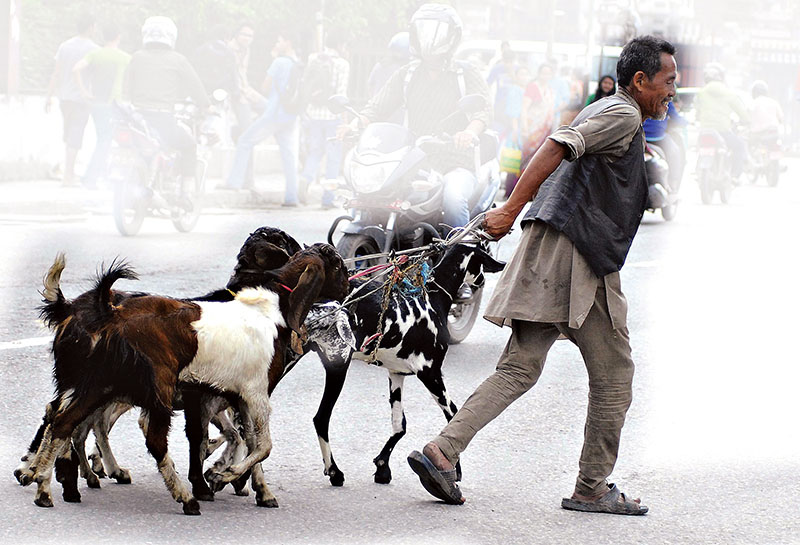Live goats will get dearer this Dashain
Kathmandu, September 21
Adding to the woes of inflation-hit consumers, traders say that price of live goats will go up this Dashain.
Reasoning that the goat price has increased in India — the major supplier — local traders say that price of live goats is likely to increase by at least Rs 25 per kg to Rs 470 per kg, compared to the average price recorded in previous Dashain.
“Domestic goat production is declining every passing year and the dependency on India to meet the market demand of goats has swelled to 85 per cent,” said Deepak Thapa, former president of Nepal Livestock Traders Association (NLTA), adding that price of Indian goats has increased significantly this year.
“Live goats will cost Rs 470 per kg on an average this Dashain, against the average rate of Rs 445 per kg last Dashain,” Thapa added.
On top of that, Thapa urged the government to encourage livestock farmers to focus on commercial pastoral farming and increase domestic livestock production, including goats. The government should provide incentives to farmers to encourage them to shift towards pastoral farming, he opined.
Livestock traders also say that increase in transportation costs due to landslides along different routes would contribute in increasing the asking price of goats this Dashain.
“Because of last year’s earthquakes and incessant rainfall this year, the roads linking India and other domestic sources of goats are in a dilapidated condition. This has increased our transportation cost,” said Shyam Khadka, a goat trader at Tukucha.
Traders plan to supply around 45,000 goats to Kathmandu Valley this Dashain. According to them, goat demand is expected to increase slightly this year due to short supply of sufficient chyangra (mountain goats). Informing that chyangra are basically supplied from China in the domestic market, Thapa of NLTA said that the market would see a crunch of chyangra due to closure of Tatopani border point.
According to NLTA, Jomsom is the only source of chyangra for Kathmandu Valley. “Chyangra of Jomsom are unlikely to reach Kathmandu as they are consumed on the way to the Capital,” NLTA officials said.
Similarly, Nepal Food Corporation (NFC) is also selling 2,500 goats at subsidised rates to consumers this Dashain through its Thapathali-based warehouse. Though few in numbers, the government entity has been selling goats at subsidised rate every Dashain to intervene in the market, control arbitrary rise in price of goats and maintain uniformity in the price.
In the meantime, consumer activists have suggested the government to regularly monitor major livestock markets to ensure that consumers are not being cheated.
“There are higher chances of anomalies from traders in terms of quality and price during the festivals. Keeping this in mind, responsible government authorities should inspect the market every day,” Madhav Timalsina, president of Consumers’ Right Investigation Forum (CRIF), said.






